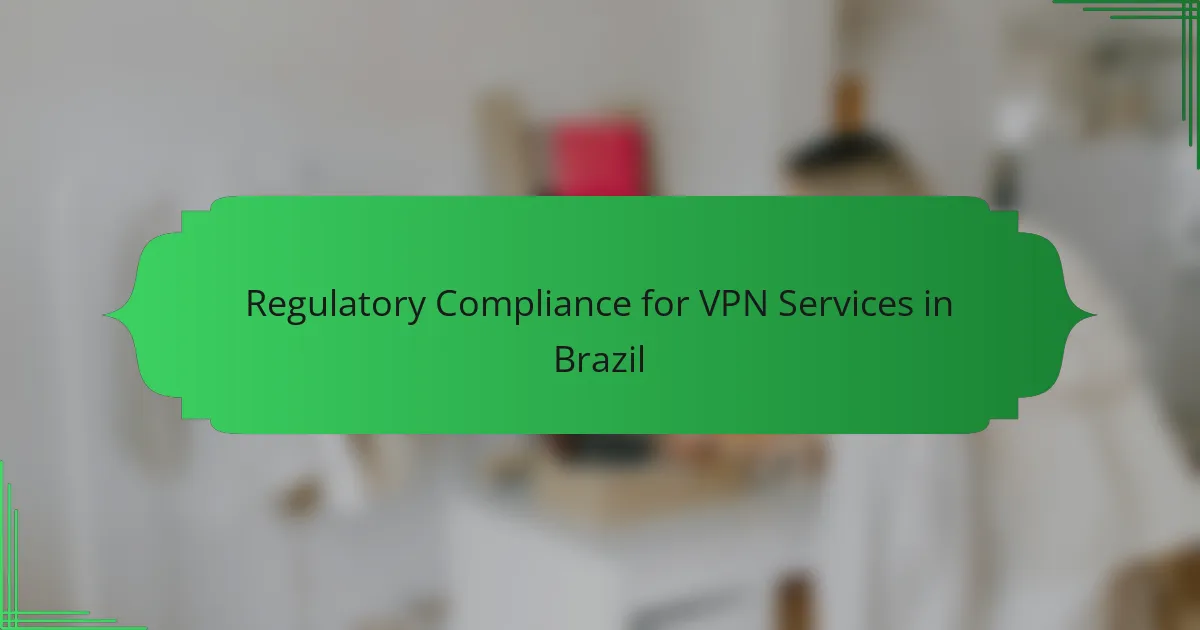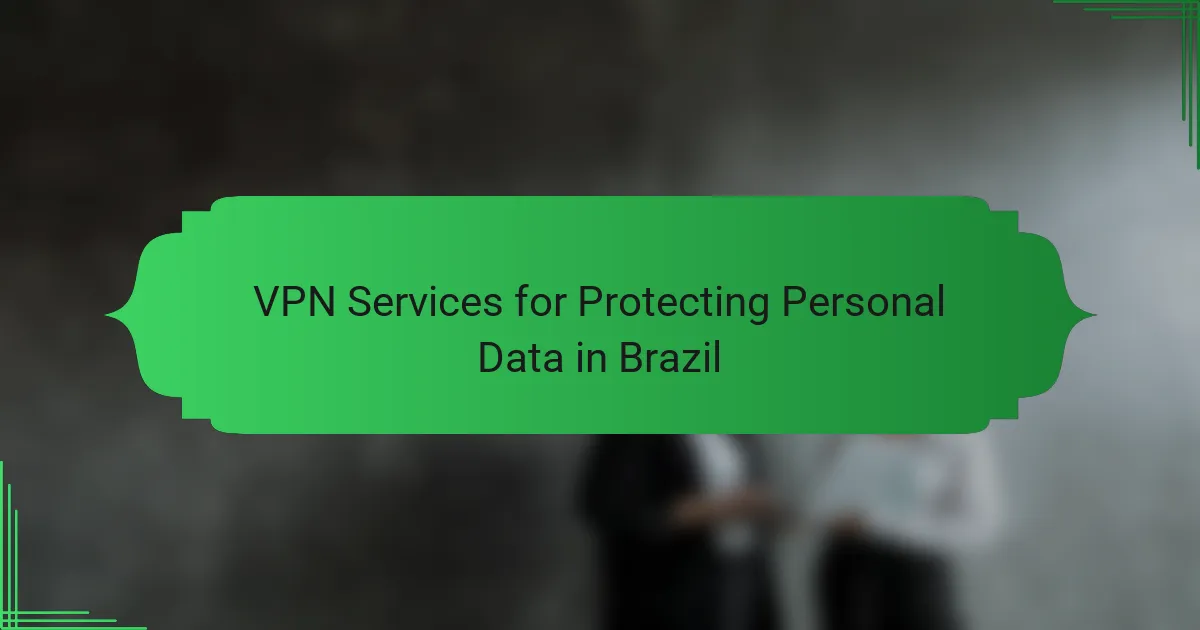In Brazil, VPN services are subject to a range of regulatory requirements designed to protect user privacy and ensure data security. Compliance with laws such as the General Data Protection Law (LGPD) is essential for providers, as failure to adhere to these regulations can result in legal penalties and loss of customer trust. Implementing robust security measures and maintaining transparent user policies are critical for sustaining business operations in this competitive landscape.
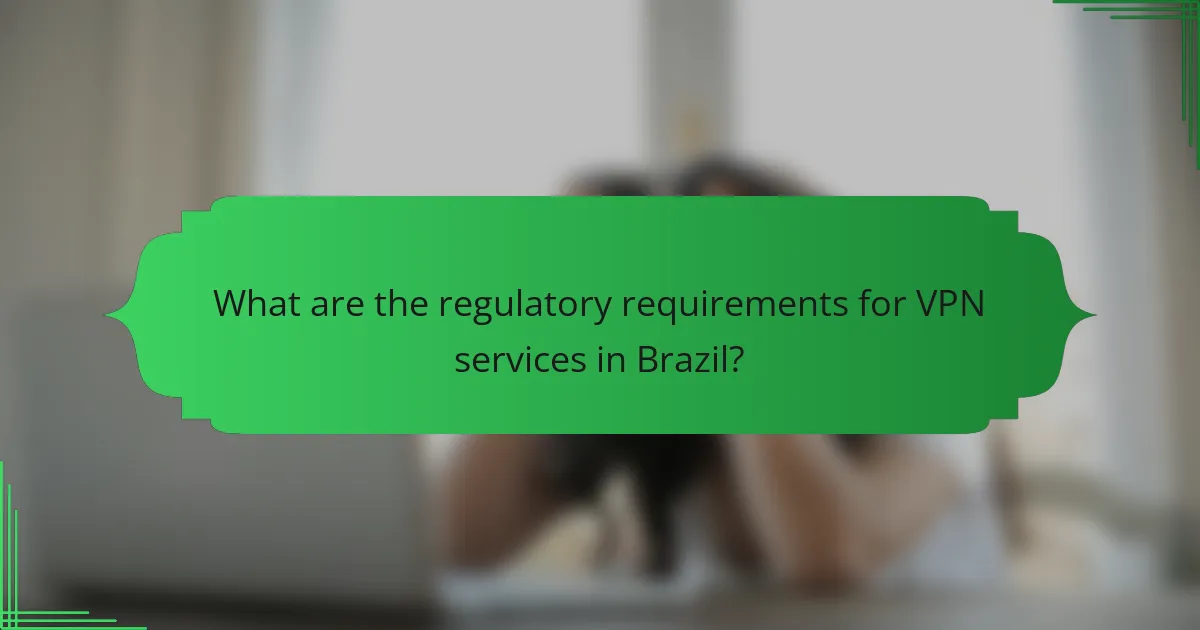
What are the regulatory requirements for VPN services in Brazil?
VPN services in Brazil must comply with various regulatory requirements, including data protection laws, consumer protection regulations, and licensing obligations. These regulations aim to ensure user privacy, data security, and fair business practices in the digital landscape.
Data protection compliance
VPN providers in Brazil are required to adhere to the General Data Protection Law (LGPD), which governs the collection and processing of personal data. This includes obtaining explicit consent from users before collecting their information and ensuring that data is stored securely.
Providers must also implement measures to protect user data from breaches and unauthorized access. Regular audits and risk assessments can help identify vulnerabilities and ensure compliance with LGPD standards.
Consumer protection laws
Brazilian consumer protection laws mandate that VPN services provide clear and accurate information about their offerings. This includes transparency regarding data usage, service limitations, and any potential risks associated with using the service.
Additionally, VPN providers must establish reliable customer support channels and address user complaints promptly. Failure to comply with these regulations can result in penalties and damage to the provider’s reputation.
Licensing obligations
While Brazil does not have specific licensing requirements for VPN services, providers must still register their business and comply with local laws. This includes adhering to tax regulations and ensuring that their services do not facilitate illegal activities.
It is advisable for VPN providers to stay informed about any changes in legislation that may affect their operations. Engaging with legal experts can help navigate the regulatory landscape effectively.
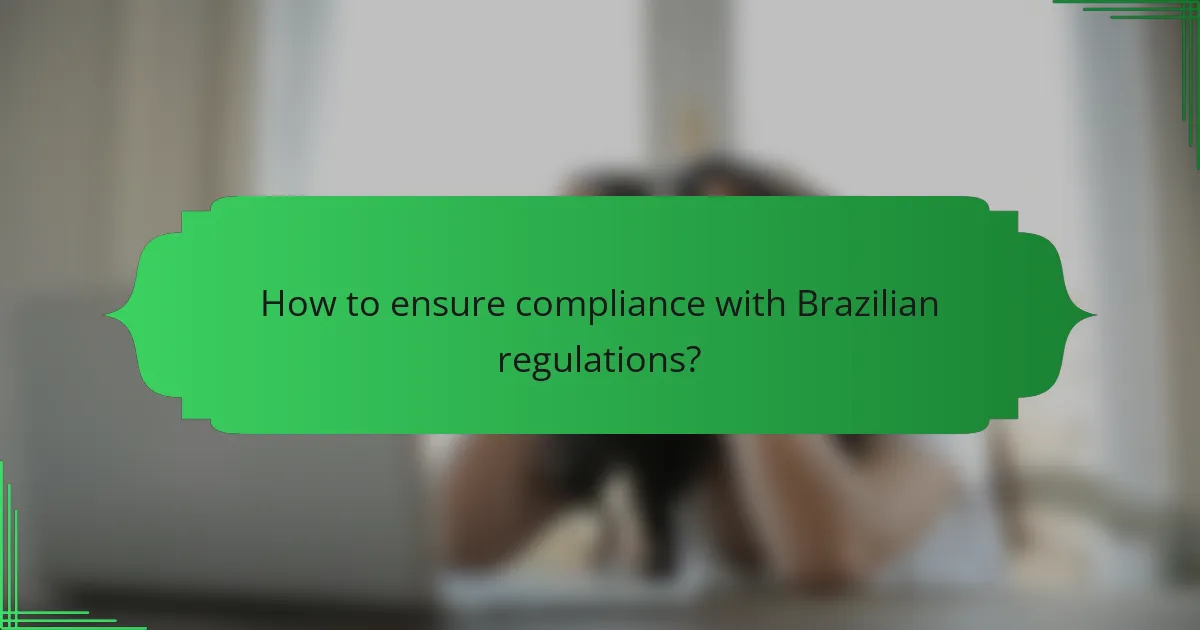
How to ensure compliance with Brazilian regulations?
To ensure compliance with Brazilian regulations for VPN services, providers must adhere to data protection laws, implement robust security measures, and regularly assess their compliance status. Key aspects include understanding the General Data Protection Law (LGPD) and maintaining transparent user policies.
Implementing data encryption
Data encryption is essential for protecting user information and ensuring compliance with Brazilian regulations. VPN services should utilize strong encryption protocols, such as AES-256, to safeguard data transmitted over their networks. This not only enhances security but also aligns with the LGPD’s requirements for protecting personal data.
Additionally, VPN providers should regularly update their encryption methods to counter emerging threats. Implementing end-to-end encryption can further enhance user privacy and build trust with customers.
Regular compliance audits
Conducting regular compliance audits is crucial for VPN services to identify and rectify potential regulatory gaps. These audits should assess adherence to the LGPD and other relevant laws, ensuring that data handling practices meet legal standards. Engaging third-party auditors can provide an objective evaluation of compliance efforts.
Providers should establish a schedule for these audits, ideally on a quarterly basis, to stay ahead of regulatory changes and maintain operational integrity. Documenting audit findings and corrective actions is also vital for demonstrating compliance to authorities.
Legal consultation services
Engaging legal consultation services can significantly aid VPN providers in navigating the complexities of Brazilian regulations. Legal experts can offer tailored advice on compliance strategies, data protection measures, and risk management. This ensures that VPN services remain informed about the latest legal developments and best practices.
Providers should consider establishing a relationship with a law firm specializing in technology and data privacy to receive ongoing support. This proactive approach can help mitigate legal risks and enhance the overall compliance framework of the VPN service.
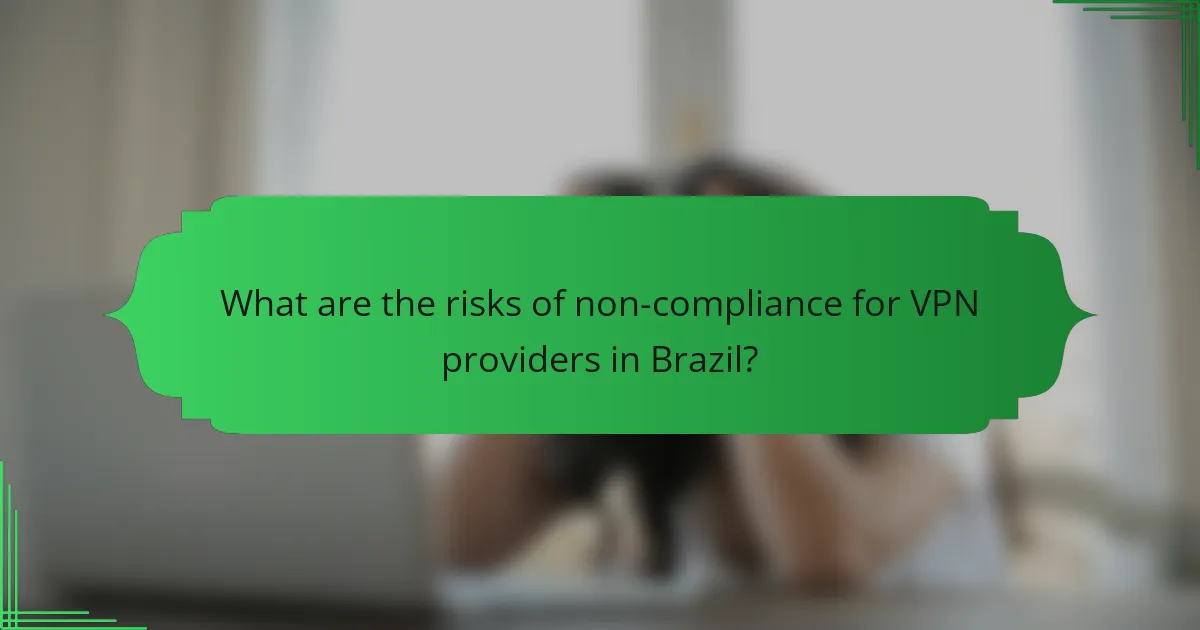
What are the risks of non-compliance for VPN providers in Brazil?
VPN providers in Brazil face significant risks if they do not comply with local regulations. These risks include legal penalties, loss of customer trust, and potential operational shutdowns, all of which can severely impact business viability.
Legal penalties
Non-compliance with Brazilian regulations can lead to substantial legal penalties for VPN providers. Fines can range from thousands to millions of Brazilian Reais, depending on the severity of the violation. Additionally, repeated offenses may result in increased fines or more severe legal actions.
Providers must stay informed about laws such as the General Data Protection Law (LGPD) and other relevant regulations to avoid these penalties. Regular audits and compliance checks can help mitigate risks associated with legal repercussions.
Loss of customer trust
Failure to comply with regulations can erode customer trust, which is crucial for VPN services. Users expect their data to be secure and handled responsibly; any breach of compliance can lead to negative perceptions and loss of clientele. This trust is often hard to regain once lost.
To maintain customer confidence, VPN providers should be transparent about their compliance efforts and data handling practices. Clear communication regarding privacy policies and compliance measures can help reassure users about their data security.
Operational shutdowns
In extreme cases, non-compliance may lead to operational shutdowns, either temporarily or permanently. Regulatory authorities have the power to suspend or revoke licenses, effectively halting services. This can disrupt business operations and lead to significant financial losses.
To avoid shutdowns, VPN providers should implement robust compliance programs and regularly review their practices against current regulations. Engaging legal experts familiar with Brazilian laws can also provide guidance on maintaining operational continuity.
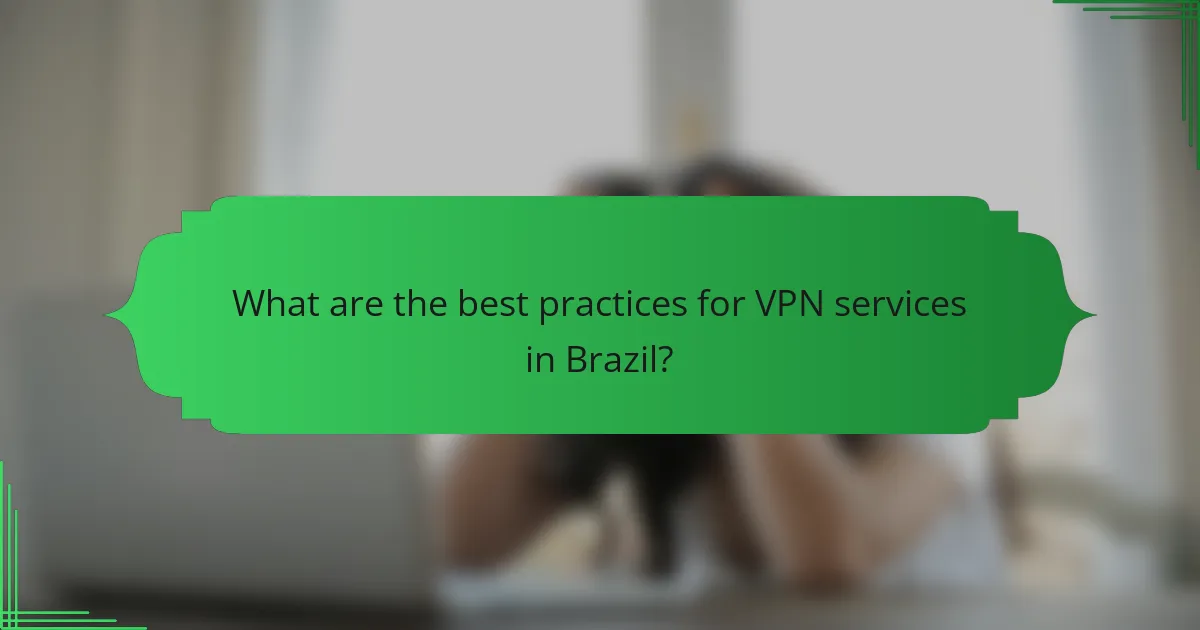
What are the best practices for VPN services in Brazil?
Best practices for VPN services in Brazil focus on ensuring user privacy, providing reliable support, and staying updated on local regulations. Adhering to these practices helps maintain compliance and fosters trust among users.
Transparent privacy policies
VPN services in Brazil should have clear and accessible privacy policies that outline how user data is collected, stored, and used. Transparency builds trust and allows users to make informed decisions about their privacy.
It’s essential to avoid vague language and ensure that policies comply with Brazil’s General Data Protection Law (LGPD). Users should easily find information regarding data retention, sharing practices, and user rights.
Robust customer support
Effective customer support is crucial for VPN services, as users may encounter technical issues or have questions about privacy. Providing multiple support channels, such as live chat, email, and phone, can enhance user experience.
Additionally, support teams should be knowledgeable about local regulations and common user concerns in Brazil. This ensures that users receive accurate information and assistance tailored to their specific needs.
Regular updates on regulations
Staying informed about changes in Brazilian regulations is vital for VPN services. Regular updates help ensure compliance with laws like the LGPD and any other relevant legislation affecting user privacy and data security.
VPN providers should actively monitor regulatory developments and communicate any changes to their users. This proactive approach not only helps in compliance but also reinforces user trust in the service.
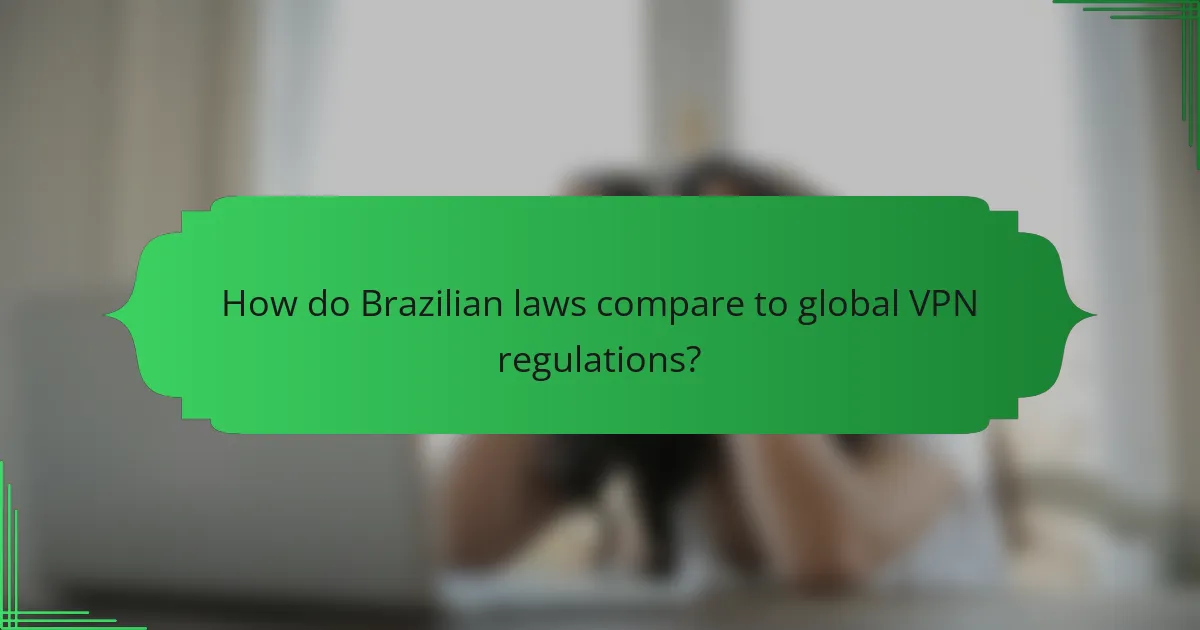
How do Brazilian laws compare to global VPN regulations?
Brazilian laws on VPN services emphasize data protection and user privacy, aligning with global standards but featuring unique local requirements. While many countries have established regulations, Brazil’s approach includes specific guidelines that affect how VPN providers operate within its borders.
Differences in data retention policies
Brazilian regulations require VPN providers to adhere to strict data retention policies, which differ from those in many other countries. For instance, under the General Data Protection Law (LGPD), VPN services must limit data retention to the minimum necessary for their operations, often not exceeding a few months.
In contrast, some countries may allow longer retention periods or have no specific requirements at all. VPN providers in Brazil must ensure compliance with these local laws to avoid penalties, which can include fines or operational restrictions.
Variations in user privacy protections
User privacy protections in Brazil are robust, largely due to the LGPD, which grants users significant rights over their personal data. VPN services must implement measures to ensure that user data is not only protected but also processed transparently, giving users control over their information.
This contrasts with regions where privacy laws may be less stringent or non-existent, allowing for broader data collection practices. Brazilian users should choose VPN providers that clearly communicate their privacy policies and demonstrate compliance with local regulations to safeguard their data effectively.
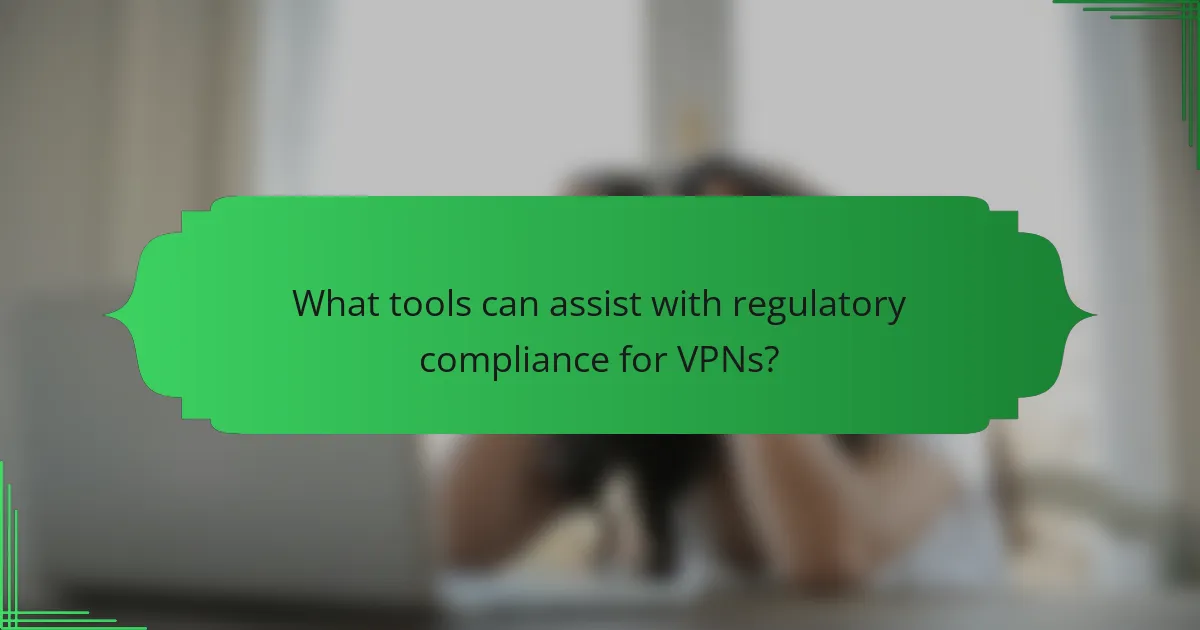
What tools can assist with regulatory compliance for VPNs?
Several tools can help VPN services in Brazil ensure regulatory compliance, including compliance management software, legal advisory platforms, and data protection impact assessment tools. These resources streamline the process of adhering to local laws and regulations, reducing the risk of non-compliance.
Compliance management software
Compliance management software helps VPN providers track and manage their adherence to regulations. These tools often feature dashboards that provide real-time insights into compliance status, making it easier to identify gaps and areas for improvement.
When selecting compliance management software, consider features such as automated reporting, audit trails, and integration capabilities with existing systems. Popular options include tools that cater specifically to data protection regulations like the General Data Protection Law (LGPD) in Brazil.
Legal advisory platforms
Legal advisory platforms connect VPN services with legal experts who specialize in regulatory compliance. These platforms can provide tailored advice on navigating Brazil’s complex legal landscape, including data privacy laws and consumer protection regulations.
Utilizing these platforms can save time and resources by ensuring that VPN providers receive accurate and up-to-date legal guidance. Look for services that offer subscription models or pay-per-use options to fit different budget needs.
Data protection impact assessment tools
Data protection impact assessment (DPIA) tools help VPN services evaluate the risks associated with data processing activities. These assessments are crucial for identifying potential compliance issues before they arise, particularly under the LGPD.
When using DPIA tools, ensure they guide you through the assessment process, including risk identification, mitigation strategies, and documentation requirements. Regularly conducting DPIAs can help maintain compliance and build trust with users regarding data handling practices.
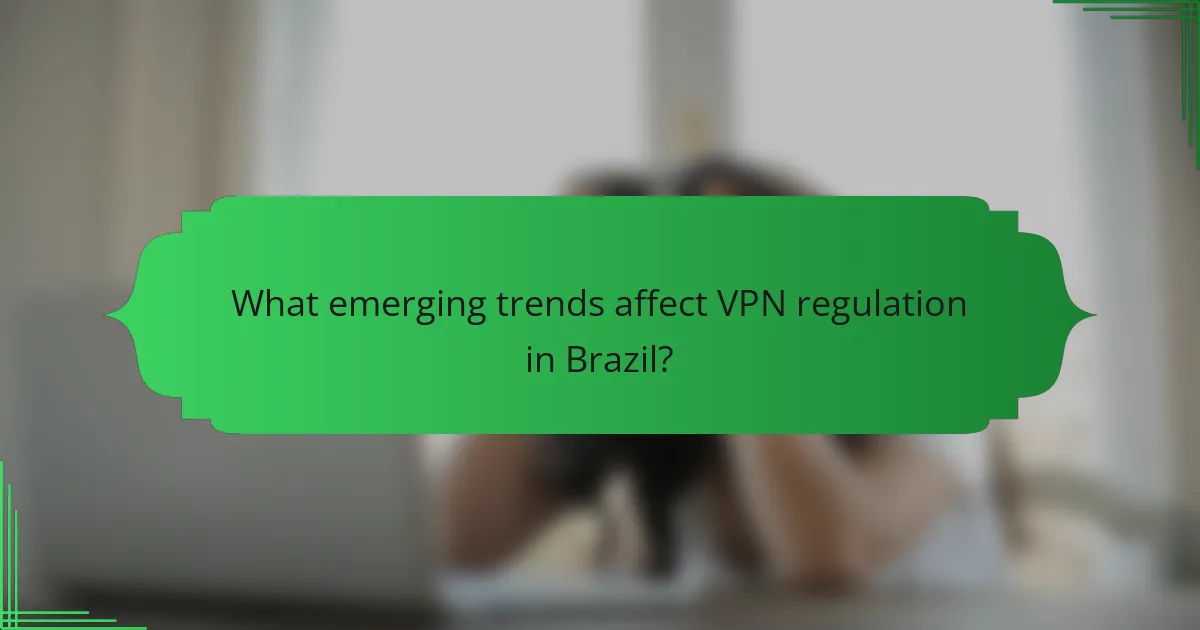
What emerging trends affect VPN regulation in Brazil?
Emerging trends in Brazil’s VPN regulation include increased scrutiny on data privacy, the rise of cybersecurity threats, and the government’s focus on digital sovereignty. These factors are shaping how VPN services operate and comply with local laws.
Increased Government Oversight
The Brazilian government is intensifying its oversight of VPN services to ensure compliance with data protection laws, particularly the General Data Protection Law (LGPD). This law mandates strict guidelines on how personal data is collected, stored, and processed, impacting VPN providers significantly.
VPN services must implement robust data handling practices to avoid penalties, which can range from fines to operational restrictions. Companies should regularly review their policies to align with evolving regulations and maintain transparency with users.
Focus on User Privacy and Data Security
As concerns over user privacy grow, Brazilian regulators are emphasizing the need for VPNs to enhance data security measures. This includes encryption standards and secure data transmission protocols to protect users from breaches.
Providers should adopt industry best practices, such as using strong encryption methods and conducting regular security audits. Offering clear privacy policies can also help build trust with users while ensuring compliance with local regulations.
Impact of Cybersecurity Threats
The rise in cybersecurity threats has prompted Brazilian authorities to consider stricter regulations for VPN services. These threats can include hacking, phishing, and data leaks, which have led to calls for more accountability from VPN providers.
VPN services should invest in advanced security technologies and stay informed about the latest threats. Regular training for staff on cybersecurity best practices can also mitigate risks and enhance overall service reliability.
Digital Sovereignty Initiatives
Brazil’s push for digital sovereignty is influencing VPN regulation, as the government seeks to control data flow within its borders. This initiative aims to protect national interests and ensure that data generated in Brazil remains within the country.
VPN providers may need to adapt their operations to comply with these sovereignty requirements, which could involve local data storage solutions. Understanding these regulations is crucial for maintaining compliance and avoiding potential legal issues.
